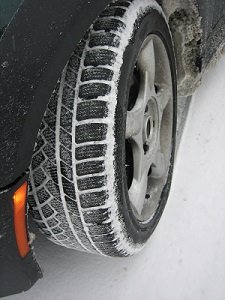Recent Posts
Categories
Winter Tires – Yea or Nay?
December 31st, 2015
In a lot of parts of the country, the winters are tough enough that all-season tires just won’t get the job done. All-season tires are a compromise; they offer good year-round traction with a quiet ride, good handling and road manners. They tend to perform well in wet weather and light wintry conditions, but when the snow is more than a couple of inches deep, all-season tires are out of their league. That’s when it’s time to consider winter tires.

Today’s winter tires are a long way from the heavy, noisy, clumsy “snow tires” or “mud grips” that your dad might have had on his station wagon 40 years ago. Modern winter tires are designed for noise, handling, steering response and road manners that rival grand touring tires, only with enhanced traction. They accomplish that with deeper, more aggressive tread grooves and a tread pattern that’s designed to eject snow and slush for a clean “bite” with every revolution of the wheel.
More importantly, the tread compound used for winter tires is substantially different. Grand touring or all-season tires can stiffen at low temperatures, reducing traction. Winter tire formulations are designed to stay flexible even when temperatures are at zero or below, meaning they can still deliver traction in winter conditions. Some winter tires come pre-drilled for studs, which can enhance traction even more in snow and light icy conditions.
There are a few things to remember with winter tires, however:
• Winter tires often don’t handle as precisely as all-season tires, due to their construction. That may not matter much in snow, when handling will be sloppy and treacherous anyway, but it can be a noticeable difference on dry pavement.
• Winter tires tend to be noisier
• Winter tires are rather fragile. That same soft rubber compound that helps with traction in snow means that the tires will wear down much more quickly in warmer temperatures. For that reason, winter tires should not be used when temperatures are above 35-45 degrees.
• If you elect to go with winter tires, you’ll need to get an entire set and not just a pair. Mixing designs of tires can result in poor traction, uneven and unpredictable performance and a “schizophrenic” car.
With all that in mind, you’re going to be the best judge of whether you really need winter tires or not. If your part of the country gets a few inches of snow that typically melts in a few days or a week, when the weather changes, winter tires might not be a real necessity. If you’re in a place like the upper Midwest, New England or the mountains, with snow measured in feet rather than inches and winter temperatures that stay below freezing for weeks on end, winter tires might be a good investment after all. If you’re leaning that way on the decision, call us and let us get you the best deal on quality winter tires that you’ll find anywhere!
Tags:
snow tires, snow and winter tires, buy snow tires, buy winter tires, winter tire benefits, winter tire tips, winter driving, winter tire decisions
Posted in:
Tire 101
